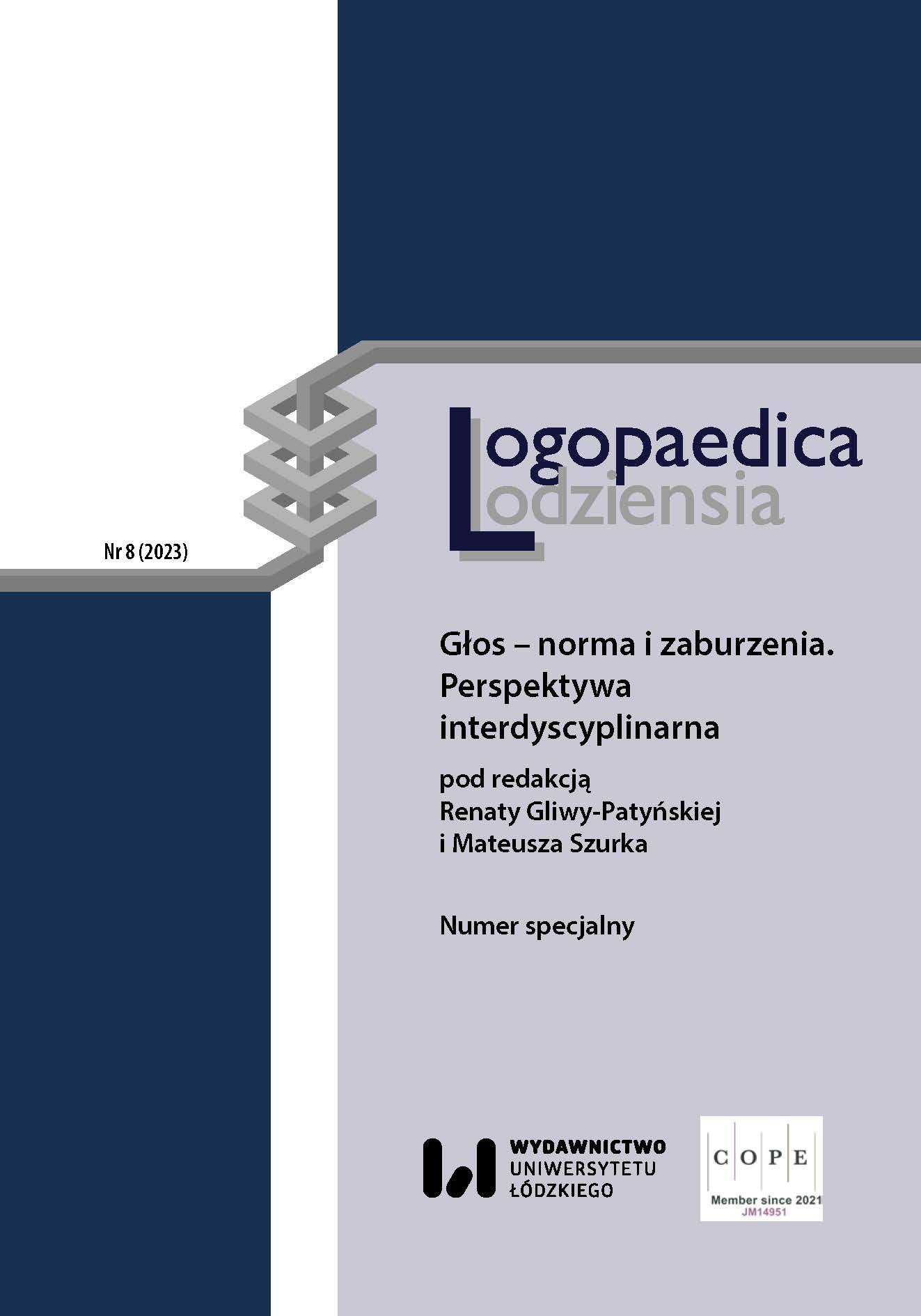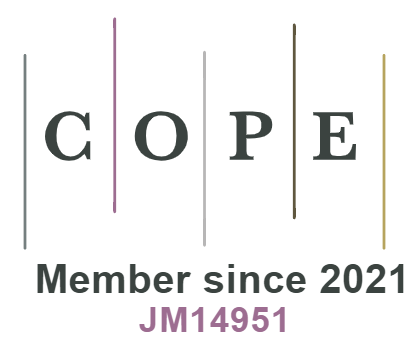Personality and Voice Disorders of Teachers
DOI:
https://doi.org/10.18778/2544-7238.08.03Keywords:
personality, voice, voice disorders, teachersAbstract
Personality may contribute to the occurrence of voice disorders. Teachers belong to a group that works in a social environment and is exposed to considerable voice strain. A study was conducted in a group of 30 teachers. The VHI and NEO‑PI‑R tool were used. The study found that the personality traits associated with voice disorders include conscientiousness and agreeableness. One practical result of the findings should be the implementation of psychological support in phoniatric departments.
Downloads
References
Almeida A.A., Fernandes L.R., Azevedo E.H., Pinheiro R.S., Lopes L.W., 2015, Characteristics of voice and personality of patients with vocal fold immobility, „Codas”, Vol. 27(2), s. 178–185, https://doi.org/10.1590/2317-1782/20152014144
Google Scholar
DOI: https://doi.org/10.1590/2317-1782/20152014144
Beauvale A., 1999, Czynnikowe ujęcie osobowości (osobowość w świetle psychologii różnic indywidualnych), [w:] A. Gałdowa (red.), Klasyczne i współczesne koncepcje osobowości, Kraków: Wydawnictwo Uniwersytetu Jagiellońskiego, s. 235–252.
Google Scholar
Binkuńska E., 2020, Emocjonalne podłoże posługiwania się głosem, [w:] B. Kamińska, S. Milewski (red.), Logopedia artystyczna. Logopedia XXI wieku, Gdańsk: Wydawnictwo Harmonia, s. 297–320.
Google Scholar
Cichecka‑Wilk M., Studzińska K., 2018, Czynnościowe zaburzenia głosu z punktu widzenia foniatrii klinicznej, psychopatologii, psychologii i psychiatrii psychodynamicznej, „Annales Universitatis Mariae Curie‑Skłodowska, Lublin, Polonia”, Vol. XXXI, No. 2, s. 175–194.
Google Scholar
DOI: https://doi.org/10.17951/j.2018.31.2.175-194
El Uali Abeida M., Fernández Liesa R., Vallés Varela H., García Campayo J., Rueda Gormedino P., Ortiz García A., 2013, Study of the Influence of Psychological Factors in the Etiology of Vocal Nodules in Women, „Journal of Voice”, Vol. 27(1), s. 129.e15–129.e20, https://doi.org/10.1016/J.JVOICE.2011.08.012
Google Scholar
DOI: https://doi.org/10.1016/j.jvoice.2011.08.012
Gałdowa A., 1999, Klasyfikacja teorii, [w:] A. Gałdowa (red.), Klasyczne i współczesne koncepcje osobowości, Kraków: Wydawnictwo Uniwersytetu Jagiellońskiego, s. 35–37.
Google Scholar
Gasiul H., 2002, Rozwój osoby podstawą rozwoju osobowości, „Studia Psychologica”, nr 3, s. 105–118.
Google Scholar
Giannini S., Ferreira L., 2021, Voice disorders in teachers and the International Classification of Functioning, Disability and Health (ICF), „Revista de Investigación e Innovación en Ciencias de la Salud”, No. 3, s. 33–47, https://doi.org/10.46634/riics.60
Google Scholar
DOI: https://doi.org/10.46634/riics.60
Hall C., Lindzey G., 2002, Teorie osobowości, Warszawa: Wydawnictwo Naukowe PWN.
Google Scholar
Hamerlińska A., 2021, Niepełnosprawność głosu u nauczycieli. Raport z badań, „Logopaedica Lodziensia”, nr 5, s. 59–67.
Google Scholar
DOI: https://doi.org/10.18778/2544-7238.05.04
Jacobson B., Johnson A., Grywalski C., Silbergleit A., Jacobson G., Benninger M., Newman C., 2016, The Voice Handicap Index (VHI): development and validation, „American Journal of Speech‑Language Pathology”, No. 6, s. 66–70.
Google Scholar
DOI: https://doi.org/10.1044/1058-0360.0603.66
Jastrzębski A., 2009, Osoba a osobowość. Psychologiczne koncepcje osobowości w świetle klasycznej antropologii filozoficznej, „Roczniki Filozoficzne”, t. LVII, nr 1, s. 29–48.
Google Scholar
Kasefy S., Torabinezhad F., Rasouli M., Zareifaskhodi B., Saffarian A., 2020, The Relationship Between Acoustic Characteristics and Personality Dimensions in Patients with Dysphonia, „Iranian Rehabilitation Journal”, Vol. 18(3), s. 337–344, http://doi.org/10.32598/irj.18.3.1046.1
Google Scholar
DOI: https://doi.org/10.32598/irj.18.3.1046.1
Kozioł‑Nadolna K., 2015, Osobowość człowieka a skłonność do wprowadzania innowacji, „Studia i Prace Wydziału Nauk Ekonomicznych i Zarządzania”, nr 39, t. 1, s. 57–66.
Google Scholar
DOI: https://doi.org/10.18276/sip.2015.39/1-05
Kraczla M., 2017, Osobowość jako czynnik zachowań menedżerskich w świetle teorii wielkiej piątki, „Zeszyty Naukowe Politechniki Śląskiej”, nr 1980, s. 195–208.
Google Scholar
DOI: https://doi.org/10.29119/1641-3466.2017.105.14
Maniecka‑Aleksandrowicz B., 1997, Klasyfikacja zaburzeń głosu, „Audiofonologia”, t. X, s. 61–67.
Google Scholar
Obrębowski A., 2008, Profilaktyka zaburzeń głosu, [w:] A. Obrębowski (red.), Narząd głosu i jego znaczenie w komunikacji społecznej, Poznań: Wydawnictwo Naukowe Uniwersytetu Medycznego.
Google Scholar
Pear T.H., 1931, Voice and personality, London: Chapman and Hall Ltd.
Google Scholar
Pervin L., 2002, Psychologia osobowości, Gdańsk: Gdańskie Wydawnictwo Psychologiczne.
Google Scholar
Pracownia Testów Psychologicznych Polskiego Towarzystwa Psychologicznego, 2006, Inwentarz Osobowości NEO‑PI‑R, https://www.practest.com.pl/sklep/test/NEO‑PI‑R (dostęp: 1.07.2023).
Google Scholar
Ratajczak J., Grzywacz K., Wojdas A., Rapiejko P., Jurkiewicz D., 2008, Role of psychological factors in pathogenesis of disturbances of voice caused with vocal nodules, „Otolaryngologia Polska”, t. 62, nr 6, s. 758–763.
Google Scholar
DOI: https://doi.org/10.1016/S0030-6657(08)70354-8
Roy N., Bless D.M., 2000, Personality traits and psychological factors in voice pathology: a foundation for future research, „Journal of Speech, Language, and Hearing Research”, Vol. 43(3), s. 737–748, https://doi.org/10.1044/jslhr.4303.737
Google Scholar
DOI: https://doi.org/10.1044/jslhr.4303.737
Śliwińska‑Kowalska M., Niebudek‑Bogusz E., 2008, Rehabilitacja zawodowych zaburzeń głosu. Poradnik dla nauczycieli, Łódź: Instytut Medycyny Pracy im. prof. J. Nofera.
Google Scholar
Śliwinska‑Kowalska M., Niebudek‑Bogusz E., Fiszer M., Los‑Spychalska T., Kotylo P., Sznurowska‑Przygocka B., Modrzewska M., 2006, The prevalence and risk factors for occupational voice disorders in teachers, „Folia Phoniatrica et Logopaedica”, Vol. 58(2), s. 85–101, https://doi.org/10.1159/000089610
Google Scholar
DOI: https://doi.org/10.1159/000089610
Zawadzki B., Strelau J., Szczepaniak P., Śliwińska M., 2010, Inwentarz Osobowości Paula T. Costy Jr i Roberta R. McCrae. Adaptacja polska, Warszawa: Pracownia Testów Psychologicznych Polskiego Towarzystwa Psychologicznego.
Google Scholar
Downloads
Published
How to Cite
Issue
Section
License

This work is licensed under a Creative Commons Attribution-NonCommercial-NoDerivatives 4.0 International License.












